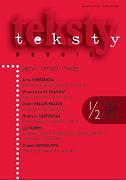Bachtin i powszechna abolicja
Bakhtin and General Abolition
Author(s): Michał MrugalskiSubject(s): Literary Texts
Published by: Instytut Badań Literackich Polskiej Akademii Nauk
Keywords: Galin Tihanov; Lukács; Bakhtin; Literary theory
Summary/Abstract: Review: Galin Tihanov, Pan i niewolnik. Lukács, Bachtin i idee ich czasów [The Master and The Slave: Lukács, Bakhtin, and the Ideas of Their Time], transl. into Polish by M. Adamiak; ed. by D. Ulicka; Oficyna Naukowa, Warsaw 2010. In his review of Galin Tihanov’s comparative study of Lukács and Bakhtin, Mrugalski argues that the work, while attentive to details, is rather weak in its general concept. Key passages are devoted to Georg Simmel’s influence on both thinkers, on Russian theory of ideology, discussions on the novel, and the notion of dialogism. On the whole, the work represents a bizarre amalgam of positivism and deconstruction – a mix of perspectives that was prevalent in the 1990s. Tihanov disassembles an oeuvre into its constituent influences, which, combined with his quasi-hysterical search for aporias, renders it effectively impossible to appreciate the originality and the signifiance of both thinkers’ concepts. Tihanov’s central allegory of Hegel’s master-slave dialectics is particularly misfortunate, and for a number of reasons: not only does it fit ill with the two thinkers’ mutual relationship, but also it stands in the way of appreciating Bakhtin’s subversion of the model of mastery and bondage. It was in fact this questioning of master-slave dialectics that informed the most groundbreaking theses of Bakhtin’s aesthetics.
Journal: Teksty Drugie
- Issue Year: 2011
- Issue No: 1-2
- Page Range: 244-252
- Page Count: 9
- Language: Polish

